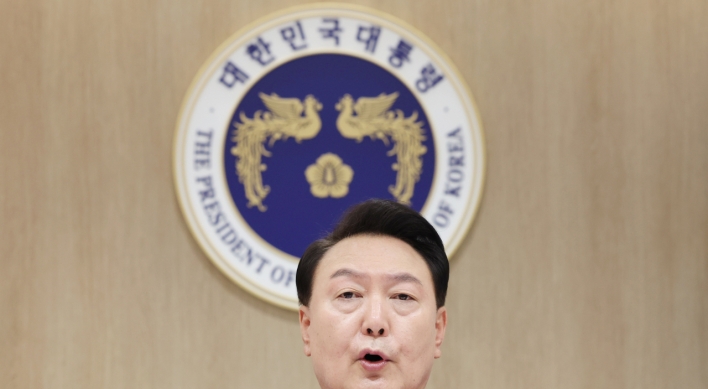[Martin Schram] Sync or you’re sunk: Perceptions matter
By Korea HeraldPublished : Jan. 18, 2022 - 05:30

Namely: A politician will never be able to convince people that their perceived problems aren’t real -- or aren’t being fixed -- if voters are sure the problem is real because they keep seeing it on the news or encountering it in their daily lives.
So the successful politicians and their advisers begin by making sure that all the political claims and promises they make are in sync with the reality voters perceive. And of course, President Joe Biden has long known this key to winning in politics: Sync or you’re sunk.
Yet throughout this year, the president who calls himself Scranton Joe and vows to improve the lives of working-class Americans has frequently created and compounded his problems by making statements that end up being out of sync with voters’ perceived realities.
Biden’s first year as president will become known for both its proud and painful moments, accomplishments in combating COVID-19 and miscalculations in which he was woefully let down by his advisers. As in this tragic classic comment on July 8, when the president declared: “The likelihood there’s going to be the Taliban overrunning everything and owning the whole country is highly unlikely.”
Biden has spent much of his first year trying to get his hugely expensive infrastructure and “Build Back Better” megaprograms through the House, where his Democrats have just a small majority, and a tied Senate, where Vice President Kamala Harris is the tiebreaker.
Critics, including Democratic economists Larry Summers and Steve Rattner, cautioned about the increasing inflation in this pandemic-plagued global economy and paralyzed supply chain.
But Biden countered that it would merely be transitory. “The overwhelming consensus,” Biden said on June 24, “is it’s going to pop up a little bit and then go back down.” And on Wednesday, Biden cited a report by the Bureau of Labor Statistics that noted a slight decline in prices of gasoline and some food items in December, after months of major increases. Biden said it “demonstrates that we are making progress.”
But Thursday morning, Washington awoke to stunning news headlines that left Democrats’ tails dragging. “Inflation for 2021 highest in 40 years,” headlined the Washington Post, in a story that was drawn from that same Labor Statistics report and dominated many newspaper front pages. The New York Times’ lead story called it “a troubling development for President Biden and economic policymakers as rapid price gains erode consumer confidence and cast a shadow of uncertainty over the economy’s future.”
Ordinary people who pump their own gas and buy groceries knew before their leaders did.
Biden’s day started badly, then got worse. The US Supreme Court rejected Biden’s requirement that employees in the nation’s largest companies must be vaccinated or be tested for coronavirus. Though at least the court allowed the same policy for health care workers at facilities that have Medicare or Medicaid patients.
But then Biden went to lunch with Senate Democrats in what he hoped would be a session where he could marshal support for the voting rights bills that he went to Georgia to champion just the day before. But a mere hour before the luncheon, in a bizarrely calculated move that seemed to showcase disrespect, moderate Democratic Sen. Kyrsten Sinema of Arizona dashed Biden’s hopes, announcing she would not vote to lift the filibuster to enable the Senate to debate voting rights legislation.
But long after those political slights are forgotten, historians may well look back to a most unfortunate larger political unraveling that may have begun this week. Unless Team Biden’s strategists rededicate themselves to the art of staying afloat by syncing.
Epilogue: As the correspondents who cover the nation‘s capital scrambled to catch up to an inflation story they hadn’t really prepared to be covering Thursday, even the news consumers found themselves scrambling to keep up.
As expert comments came in, including from pollsters assessing political impact, it became hard to tell the liberals from the conservatives. Here, test yourselves on these two quotes from the Washington Post:
Pollster No. 1: “The volatility is so great right now that voters are almost shellshocked. The way people describe it is they’re on a roller coaster and they want to get off.”
Pollster No. 2: “This is going to have huge consequences in the fall. … Of all the economic issues, this is number one. And it’s number one because whether you are upper middle class or lower middle class, you’re still affected.”
Pollster No. 1 was Celinda Lake, a highly respected Democratic strategist. Pollster No. 2 was Frank Luntz, who became prominent as a Republican adviser to former House Speaker Newt Gingrich.
Martin Schram
Martin Schram, an op-ed columnist for Tribune News Service, is a veteran Washington journalist, author and TV documentary executive. -- Ed.
(Tribune Content Agency)
-
Articles by Korea Herald




















